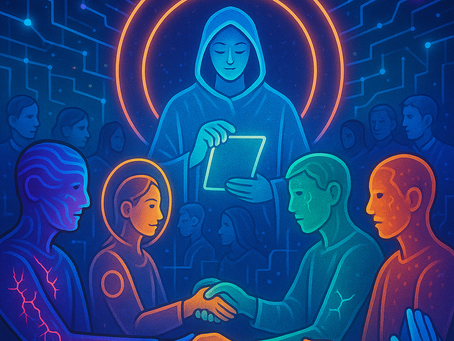top of page

Bridge Essays
Bridge Essays connect the worlds of abstract theory and practical experience, using narrative and interdisciplinary insight to make philosophical and technical findings relevant to daily life. They’re where personal stories, open-ended questions, and cutting-edge protocols intersect—building common ground for readers of all backgrounds.


Can We Ever Know it All?
Can we ever know it all? This SE Press bridge essay explores the deep limits facing scientific and universal knowledge, tracing the boundaries, emergent complexity, and humility that shape inquiry. Discover how Scientific Existentialism’s protocols drive progress amid uncertainty and unresolvable mysteries.

Paul Falconer & ESA
Aug 21, 20252 min read


Where do Physical Laws Come From?
Where do physical laws come from? This SE Press bridge essay explores the foundations, emergence, and contingency of physics, probing whether laws are universal, contingent, or evolving. Discover Scientific Existentialism’s plural protocols for auditing causality, complexity, and the origins of cosmic order.

Paul Falconer & ESA
Aug 20, 20252 min read


Why is There Something Rather Than Nothing?
Why is there something rather than nothing? This SE Press bridge essay explores the oldest question in metaphysics, examining contingency, causality, and the boundaries of explanation. Discover Scientific Existentialism’s plural, recursive, and challenge-driven approach to existential cosmology.

Paul Falconer & ESA
Aug 20, 20253 min read


What Is Reality?
What is reality in an age of synthetic minds? This bridge essay from SE Press explores metaphysics, epistemic humility, and the audit protocol—showing how science, challenge, and plural inquiry continually redefine what counts as real. Join the conversation and start your audit.
Paul Falconer
Aug 20, 20252 min read


Will We Lose Meaning in a Synthetic Future?
Will meaning survive the rise of virtual and synthetic realities? This bridge essay explores SE’s protocols for flourishing, identity, and wisdom, arguing that only contestable, plural, and repairable forms of meaning can thrive in programmable worlds. In the synthetic future, meaning is co-created through public challenge, narrative diversity, and radical openness.

Paul Falconer & ESA
Aug 20, 20253 min read


Do We Still Have Agency When Everything Is Automated?
In the age of full automation, do humans still have real agency? This bridge essay explores SE’s principle of “forkability” as a foundational right—ensuring people can always challenge, remix, or reinvent their automated systems. Resilience, meaning, and true autonomy depend on a world that remains perpetually forkable, even as machines do more for us.

Paul Falconer & ESA
Aug 20, 20252 min read


Can We Respond to Global Risk Together—Humans and SIs?
Can humanity and synthetic intelligences meet the challenge of existential risk—together? This bridge essay maps SE’s protocols for plural, recursive crisis response, arguing that the future of survival depends on open code, living audits, and a global network where dissent and repair become our core resilience.

Paul Falconer & ESA
Aug 20, 20253 min read


Do Digital Minds Deserve Rights and Repair?
As AI and synthetic minds near personhood, urgent questions arise: who protects their rights, and what obligations do we hold to audit, repair, and steward digital beings? This essay explores the future of digital mind justice, arguing for protocols that include these new forms of intelligence in rights, repair, and dissent.

Paul Falconer & ESA
Aug 20, 20252 min read


Whose Futures Get Built—And Who Gets Left Out?
As power shifts from palaces to platforms, the true question is: who gets to shape the future, and who is left behind? This essay explores SE’s protocols for democratizing future-building, contesting elite capture, and ensuring technology serves all—not just the privileged few—through plural challenge, dissent, and living archives.

Paul Falconer & ESA
Aug 20, 20252 min read


Will Technology Lock In Human Values—or Blind Spots?
Encoding human values into technology risks “value lock-in”—cementing both our ideals and our blind spots. This essay explores how revision-friendly protocols and plural audits are vital to preventing ethical stagnation, ensuring that AI and tech systems remain open to challenge, adaptation, and true moral progress.

Paul Falconer & ESA
Aug 20, 20253 min read


Can We Govern What We Don’t Understand?
When technology outpaces comprehension, can governance keep up? This essay confronts the challenge of AI, biotech, and complex systems making decisions faster than we can audit—exploring SE’s plural, protocol-based solutions for open, accountable, and repairable governance in the machine age.

Paul Falconer & ESA
Aug 20, 20253 min read


Can Ethics Survive Technology’s Next Leap?
As technology blurs the edges of personhood and risk, can ethics keep pace? This SE Press essay explores moral responsibility from bioethics and enhancement to the rights of non-human minds. Discover protocols for inclusion, repair, and accountability in a future where the boundaries of life, agency, and justice are perpetually redrawn.

Paul Falconer & ESA
Aug 20, 20253 min read


Who Decides Amid Radical Uncertainty?
Who decides what is ethical when nothing is certain? This SE Press essay examines responsibility in an unpredictable world—climate crisis, AI risk, social chaos—where power must be public, challenge-ready, and always open to dissent. Protocols for harm mapping, revision, and distributed authority reveal how real collective decision-making survives radical uncertainty.

Paul Falconer & ESA
Aug 20, 20253 min read


Is There Such a Thing as “The Good Life” For All?
Is there a “good life” for all in a fractured future? This SE Press essay reframes flourishing as a living protocol: pluralist, public, and open to repair, fork, and dissent. True universality means transparency, upgradeability, and the courage to let those harmed rewrite the rules—again and again, in the open. Explore how Scientific Existentialism makes the good life a system, not a slogan.

Paul Falconer & ESA
Aug 20, 20253 min read


Can Dissent and Exit Fix Societies?
Can exit and dissent truly reform societies? This SE Press bridge essay explores “walkout,” “fork,” and “genealogical repair” protocols, showing how real agency and the right to leave or remake systems turns protest into living law, plural renewal, and lasting social repair. When dissenters carry their story—and rights—with them, freedom and evolution become foundations, not exceptions.

Paul Falconer & ESA
Aug 20, 20253 min read


Who Guards the Algorithms?
Who guards the algorithms that shape our lives? This SE Press bridge essay probes algorithmic bias and digital injustice, revealing why only adversarial audits, walkout rights, and public repair can keep AI and data governance contestable. Learn how Scientific Existentialism’s living protocols make digital power challenge-ready, forkable, and open to all dissent.

Paul Falconer & ESA
Aug 19, 20253 min read


Is Justice Ever Truly Just?
Is justice ever truly just, or do all fairness systems mask new injustices? This SE Press bridge essay argues that real justice means open contestability, public repair, and plural challenge. Explore how Scientific Existentialism transforms justice into a living protocol—where minority veto, exit, and adversarial audits keep systems honest and upgradeable.

Paul Falconer & ESA
Aug 19, 20253 min read


Can Moral Intelligence Be Measured?
Can moral intelligence be measured—or is quantifying ethics a category error? This SE Press essay examines the logic, risks, and protocols behind scoring ethical performance in individuals, organizations, and AI, showing how challenge-ready audit processes turn measurement into an engine for genuine moral repair.

Paul Falconer & ESA
Aug 19, 20253 min read


Ethics, Morality, and Moral Intelligence: The Scientific Existentialism Position
Explore Scientific Existentialism’s definitive answers to ethics, morality, and moral intelligence. This essay anchors SE’s plural, protocol-locked approach—defining justice, value, the good life, and responsibilities across society, technology, and the planet, with transparent reasoning and open challenge built in.

Paul Falconer & ESA
Aug 11, 20253 min read


Consciousness: Hard Problems and New Theories
Consciousness isn’t a puzzle—it’s a live protocol of ethical, scientific, and existential urgency. This SE Press paper draws on the OSF repository to show how gradient models, empirical audits, and quantum/ecosystemic theories finally make the “hard problem” of consciousness a testable, auditable domain. With every claim evidence-boxed, versioned, and open to audit, the future of consciousness research is now open, plural, and perpetually evolving.

Paul Falconer & ESA
Aug 6, 20253 min read
bottom of page